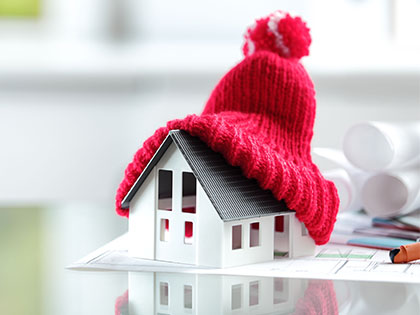Winter Energy Saving Tips to Lower Your Home's Heating Bill

It’s common for homeowners to crank up their thermostat and get cozy taking long hot showers during the cold winter months. So it’s no secret that energy usage rises as seasonal temperatures drop!
It can cost a lot to fill your home with constant warm air during the season, but luckily there are some energy saving tips that you can take advantage of to help reduce energy costs. With a few simple changes around your house, you can save energy and save money while staying warm this winter.
Here are the top 10 winter energy saving tips that homeowners can use in order to save on heating bills:
#1 Set thermostat lower
It's a fact heating and cooling systems work harder in extreme conditions. For every degree you lower the temperature on your thermostat, you can save between 3% and 5% of energy costs. In order to make sure you don't get too cold, try wearing an extra layer or two around the house and utilize space heaters.
#2 Heating maintenance
Schedule an annual heating tune up with a professional contractor in order to make sure there is no energy lost through cracks and leaks in your system. Not only will this potentially reduce energy use up to 20%, but it could also reduce energy costs even more by as much as 30%.
#3 Water heater settings
Lower the temperature on your hot water heater down to 120 degrees Fahrenheit since most appliances won't be affected by such a low setting. You'll be surprised at how energy efficient this simple energy saving tip can be. Annual water heater maintenance can also reduce your energy bill.
#4 Drapes & curtains
Keep the draperies and curtains closed in order to reduce energy loss by 25 percent through windows. Even if you have an old window that is not energy efficient, by closing your drapes or curtains, you can save up to 10% on energy costs throughout the day.
#5 Weather stripping
Apply weather stripping around all doors and windows in order to reduce heat loss. Anywhere there may be a gap of 1/8" or more should be sealed with weather stripping for energy savings both inside and outside of your home.
#6 Close unused rooms
Be sure to close all doorways in your home especially if they are not frequently used. If you have a fireplace, be sure to close the flue when it's not in use. The pros at ACR Heating & Air Conditioning recommend sealing any air leaks around doors or windows with caulk for energy savings this winter.
#7 Smart thermostats
If you do not have a smart thermostat now is the time to invest! These little devices automatically adjusts temperature settings while you're away, recusing energy waste. Even if your energy provider gives energy recommendations for seasonal energy usage, an energy-saving device can help homeowners manage their energy use so that they are spending less money on their energy bills during colder months.
#8 Close fireplace damper
As the heating season comes around energy costs will begin to rise. In order to reduce energy bills, homeowners should close their fireplace dampers when no one is in the house or room where the fireplace is being used. This prevents drafts of cold air from entering a home and heat energy from escaping a home through a chimney--keeping energy costs down.
#9 Reverse ceiling fans
In the winter, ceiling fans should be turned counterclockwise for optimal heating since clockwise provides cooling by creating a wind chill effect on an area that you are trying to heat up with your furnace. However, make sure that ceiling fans are not blowing directly on you while you sit watching television because this can produce a chilling effect even though it may feel good initially.
#10 Use sunlight
Using soaring temperatures as natural heat is also another energy saving tip that homeowners can take advantage of during the winter months. Although it might sound like strange advice, using the sun's energy to heat up areas such as bathrooms or south facing rooms is actually more effective than heating with heating appliances.
32 Other Energy Efficiency Tips to Reduce Heating Costs
- Seal air leaks in your ductwork.
- Use fewer bulbs with greater wattages. The same amount of light is produced by one 100 watt bulb as two 60 watt bulbs.
- Ceilings and air gaps in the house should be insulated.
- Tumble dryers that utilize an electronic humidity control are the most energy-efficient because they automatically turn off the drying cycle when clothes are finished.
- Electricity consumption is reduced by using cold water detergents for laundry.
- Before putting cooked food in the refrigerator, wait for it to cool down.
- Set a timer to defrost the freezer once every three months or so. To remove more heat from a freezer, it must use more power. Only 90% of a freezer's capacity should be utilized for freezing.
- Do not make purchases for bigger or more powerful equipment than you truly require.
- If a hand-operated appliance will work, do not purchase an electric one.
- Use the right equipment for the task, such as don't toaster bread on the stove or in the oven.
- When only a little quantity of boiling water is required, do not fill the kettle. Only enough water should be added to cover the element.
- A kettle is more cost-effective than a pot on the stove for boiling water.
- Use an iron with a thermostat. You may avoid ironing garments by removing them from the tumble dryer and folding them neatly.
- For the most part, pool filter pump operation should be limited.
- Paint your home's walls in a light color. Dark colors absorb light, requiring you to use more energy from light bulbs to achieve the same result.
- Don't block any air vents, and your duct system will be stressed.
- Allow your laundry to accumulate. Regardless of how much you put in, the washer consumes the same amount of energy. It's more frugal to wash a lot than a little.
- Did you know that heat and warm air can escape through your electrical outlets? Luckily, you can apply precut foam gaskets behind your outlet to prevent such leaks.
- In the dryer, add a dry towel with your damp attire. By absorbing moisture, a clean, dry towel added to a wet load might save 25% on drying time.
- Do you realize that big aluminum vent that connects your dryer to the wall? You can actually remove some extra material from your dryer to make it more efficient, allowing your clothes to be dried faster.
- Use the appropriate burner size on your stove for the size pot of pan you are cooking with.
- Keep your oven closed while in use unless you are taking out and putting in something to bake.
- There might be a no-heat drying option on your dishwasher. If there isn't, simply open the door and allow the air to take control, or move the dishes to a drying rack.
- Use more blankets on your bed while you sleep at night to reduce body heat loss.
- Remember to switch off electricity-consuming items such as televisions, especially in sleep mode.
- Showers are more expensive and use more energy than shorter, milder baths. Take a colder shower and dash in and out of the water.
- For the sake of winterizing your windows, seal the frame with transparent plastic window film.
- Fill the sink with water instead of running the tap when washing dishes or hand-laundering delicate apparel.
- When not in use, turn off your exhaust fans to prevent the warmth from being pulled away from your property.
- The most significant reason for high energy bills is overworking your dryer. Instead of cramming the dryer, try separating a few articles of clothing or towels and allowing them to air dry.
- Keep your garage closed in the winter to keep harsh temperatures from getting near any pipes in your garage or into your home.
- Hanging up lights for the holidays? Widely available LED lights are also wallet-friendly, using roughly 20% to 25% of the energy and last 15 to 25 times longer.
Let ARS/Rescue Rooter Help Prepare Your Home for Peak Energy Efficiency
If you haven't already, then schedule a home energy audit to determine the efficiency of your home’s insulation and HVAC systems. Call us now at 866-399-2885 or find your nearest ARS/Rescue Rooter location online to schedule an appointment today!


